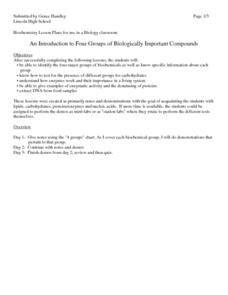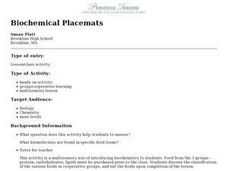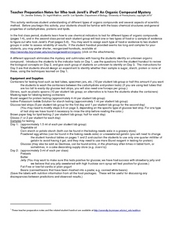Curated OER
Biological Molecules
Ninth graders examine the structure and function of biomolecules. In this food molecule lesson plan, 9th graders will examine various types of biomolecules such as carbohydrates, lipids, proteins, and nucleic acids. They will...
Virginia Department of Education
The Ratio of Surface Area to Volume
Demonstrate the ratio of surface area to volume in your high school class by using phenolphthalein, gelatin, and an onion. Intrigue the class by leading a discussion on osmosis and diffusion, then making "scientific jello." Participants...
Curated OER
An Introduction to Four Groups of Biologically Important Compounds
Learners learn about the four biochemicals that are important biologically. In this biochemicals lesson plan, students identify the four major groups of biochemicals including carbohydrates, proteins, lipids and nucleic acids. They are...
Curated OER
Testing for Life
Students test for organic molecules to determine if a solution contains once living molecules. In this characteristics of life lesson, students test common liquids for the presence of organic molecules, including starch, protein, and...
Curated OER
Dietary Supplements and the Chemistry of Life
Learners study the effects of dietary supplements on bodily functions. In this health lesson students calculate their caloric needs and research dietary supplements.
Curated OER
Cell 5 Diffusion and Osmosis
Students distinguish between active and passive transport. Students identify key words associated with active and passive transport. They draw and explain the structure f the cellular membrane. They are able to define phospholipid...
Virginia Department of Education
Structure and Function of Cell Membranes
Lead your high school class on an exploration inside the cell. Individuals investigate the relationships between cells structure and function given their relative locations on the cell membrane. They explore the concept of homeostasis...
Curated OER
The Effects of Temperature on Chemical Mixtures
Students explore chemical cahnges and the effect of temperature on chemical mixturees, They make observations of the behavior and appearance of certain chemical mixtures and reactions.
Curated OER
Biochemical Placemats
Students group various foods according to whether they are proteins, carbohydrates, or lipids. This activity is a multisensory way of introducing students to biochemistry. Students also learn how icons represent the molecular composition...
Curated OER
Testing for Life’s Molecules
Want to hear a joke about sodium? Na. Young scientists test various materials to identify if they include protein, starch, and glucose by using the Biuret test, iodine starch test, and Benedict's test respectively. After practicing with...
Virginia Department of Education
DNA Extraction from Strawberries
Has your class ever been astounded by the complexity of DNA analysis? Have they ever asked why genetic engineering has become so important to our daily lives? Young scientists perform DNA extraction on strawberries and explore how the...
Curated OER
Observation Milk Fat Lesson
Turn your class loose to experiment with the different fat content in skim milk, whole milk, half and half, and heavy cream. This is a visually vibrant experiment, as learners drip food coloring on the surface of the products and measure...
Science 4 Inquiry
The Last Supper: Identifying Macromolecules
Why do medical examiners always state the contents of a person's stomach? Scholars learn about the importance of macromolecules through a case study of stomach contents. They perform multiple tests to determine a conclusion before they...
Curated OER
What's Outside the Cell Membrane ?
Students examine the cell coats (matrix) of chondrocytes and fibroblasts and observe these cells actively exclude particles which are released around them. They observe the function of the cell membrane as a gatekeeper as it prevents...
Curated OER
Cell physiology and chemistry
Young scholars design an experiment to discriminate between chemical diffusion, osmosis, facilitated diffusion and active transport through a membrane. Be specific about predictions and interpretations!
Curated OER
Who Took Jerell's iPod?
Young scholars investigate various substances to determine the perpetrator of a crime. In this biology lesson, students test for the presence of organic compounds in various samples. They identify an unknown substance based on its...
Curated OER
How Genes Work Lesson Plan
Students define the key terms that are the structure and function of DNA. In this genetics lesson plan students complete a lab activity in which they construct a model DNA structure.
Curated OER
Enzyme Lab
Young scholars examine the effects of specific enzymes on samples of liver tissue, muscle tissue (chicken), apples, and potatoes.
Curated OER
Testing for Life
Students discuss food and the food groups and their organic nature. They test 3 different solutions and test for protein, starch and glucose. In addition, they create a master table on the board to collect all the teams results.
Curated OER
Where Do All the Toxins Go?
Young scholars demonstrate how chemicals accumulate in fish fat. They study path ways of toxins in the fish's body and ways to prepare fish to avoid consuming the toxins. They examine U.S. and Canada regulations to protect the environment.
Curated OER
Going to Extremes
Students compare and contrast Archaea with bacteria and other organisms. In this ocean lesson students complete diagrams.
Curated OER
Molecular Modeling
Students recognize that the fundamental building block of all organic and inorganic matter is the atom. They construct models of a sugar, fatty acid, amino acid and nucleic acid and describe their roles.
Curated OER
"Mush Lab"
Students use the information they learned from reading food labels to create mush meals. They blend unlikely meals together to form the mush and then evaluate its nutritional value. They examine their own eating habits after the lab is...






















